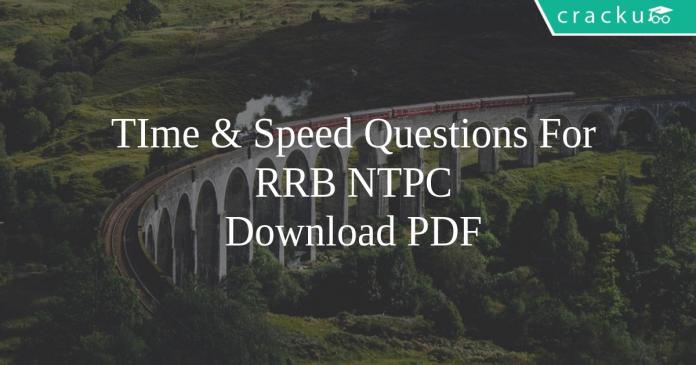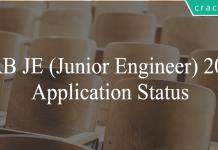Time & Speed Questions for RRB NTPC PDF
Download RRB NTPC Time & Speed Questions and Answers PDF. Top 25 RRB NTPC Maths questions based on asked questions in previous exam papers very important for the Railway NTPC exam
Download Time & Speed Questions for RRB NTPC
RRB NTPC Previous Papers [Download PDF]
Question 1: P can do a work in 10 days, Q can do the same work in 20 days and after working for 2 days, C joins the work and after 2 days work has been completed. How many does C alone take to complete the work ?
a) 4
b) 3
c) 5
d) 6
Question 2: A and B can do a piece of work individually in 14 hours and 21 hours respectively. A started the work and will be assisted by B on every alternate hour. Then find the time in which the total work will be completed?
a) 10 hours 40 minutes
b) 12 hours 20 minutes
c) 11 hours 24 minutes
d) 14 hours 40 minutes
Question 3: A and B can do a piece of work individually in 12 hours and 20 hours respectively. They work on alternate hours starting with A. Then in how many hours, will the total work be completed?
a) 12 hr 48 min
b) 14 hr 48 min
c) 16 hr 36 min
d) 14 hr 36 min
Question 4: A,B and C can do a piece of work individually in 12,16 and 24 days respectively. They all started the work together but after 4 days, A and B left. Then, in how many days total work will be completed?
a) 4 days
b) 6 days
c) 10 days
d) 12 days
Question 5: The speed of boat upstream and speed of boat in still water are in the ratio 3:4. If speed of stream is 24 km/hr, then find the speed of boat downstream.
a) 100 km/hr
b) 120 km/hr
c) 180 km/hr
d) 160 km/hr
Question 6: Two trains are running on two parallel tracks at 56 km/hr and 38 km/hr. The faster train passes a man standing in slower train in 24 seconds. Then find the length of the faster train.
a) 100 m
b) 160 m
c) 180 m
d) 120 m
Question 7: A bus travels at 75 km/hr without stoppages and if stops are included, the speed is reduced to 45 km/hr. Then, how many minutes per hour does the bus stop?
a) 16 min
b) 22 min
c) 24 min
d) 32 min
Question 8: The ratio of speed of boat upstream and speed of boat downstream is 5:14. If speed of stream is 18 km/hr, then find the speed of boat in still water.
a) 34 km/hr
b) 28 km/hr
c) 38 km/hr
d) 24 km/hr
Question 9: A train travels a certain distance at 60 km/hr and returns at 30 km/hr. Find the average speed.
a) 35 km/hr
b) 40 km/hr
c) 50 km/hr
d) 45 km/hr
Question 10: A person travels from his home to his office at a speed of 40 km/hr and returns at a speed of 60 km/hr.
a) 42 km/hr
b) 36 km/hr
c) 24 km/hr
d) 48 km/hr
RRB NTPC Previous Papers Download PDF
RRB JE PREVIOUS PAPERS DOWNLOAD
Question 11: A train travelled a distance of 480 km at uniform speed. If the speed is reduced by 8 km/hr, it would travel 3 hours late. Then, find initial speed of the train.
a) 32 km/hr
b) 48 km/hr
c) 56 km/hr
d) 40 km/hr
Question 12: A train travels a distance of 240 km at uniform speed. Due to breakdown, then speed is reduced by 10 km/hr and hence it travels the destination 4 hours more. Find the initial speed of the train.
a) 25 km/hr
b) 30 km/hr
c) 35 km/hr
d) 40 km/hr
Question 13: If speed of boat in still water is double of speed of boat upstream, then find the ratio of speed of boat downstream to that of current.
a) 2:3
b) 3:2
c) 4:3
d) 3:1
Question 14: A boat can travel at 54 km/hr downstream. If the speed of stream is 14 km/hr, then find the speed of boat upstream.
a) 24 km/hr
b) 36 km/hr
c) 26 km/hr
d) 38 km/hr
Question 15: If speed of boat in still water is triple of speed of current, then find the ratio between speed of boat upstream to that of downstream.
a) 1:2
b) 2:3
c) 3:4
d) 3:2
18000+ Questions – Free SSC Study Material
Download General Science Notes PDF
Question 16: If the ratio of speed of boat upstream to that of downstream is 1:2, then find the ratio of speed of boat in still water to speed of current.
a) 2:1
b) 3:1
c) 3:2
d) 4:3
Question 17: A train crosses a platform of length 180 m in 16 seconds. It crosses a man standing on the platform in 4 seconds running at same speed. Then, find the length of the train.
a) 80 m
b) 60 m
c) 120 m
d) 100 m
Question 18: A train of length 120 m crosses a platform of length 160 m in 14 seconds. Then, what is the speed of the train?
a) 72 km/hr
b) 84 km/hr
c) 20 km/hr
d) 54 km/hr
Question 19: Find the length of the train travelling with 90 kmph if it crossed a 600m bridge in 56 seconds ?
a) 950 m
b) 900 m
c) 850 m
d) 800 m
Question 20: Find the speed of a train of length 600m, which crossed a man standing on the platform in 24 seconds ?
a) 40 kmph
b) 80 kmph
c) 45 kmph
d) 90 kmph
Question 21: 6 children can eat 48 chocolates in 12 days. Then how many children can eat 72 chocolates in 6 days ?
a) 14
b) 16
c) 18
d) 20
Daily Free RRB Online Tests for RRB Exams
Question 22: Two trains X and Y are travelling in the same direction. Their lengths are 850m and 950m respectively. They took 6 mins to cross each other. Find the speed of train X if the speed of train Y is 90 kmph ?
a) 72 kmph
b) 74 kmph
c) 76 kmph
d) 78 kmph
Question 23: Find the speed of the flight if it takes 6 hrs 30 mins to travel 2,210 km ?
a) 280 kmph
b) 300 kmph
c) 320 kmph
d) 340 kmph
Question 24: A car travels x km at 60 kmph and then 2x km at 40 kmph. Find its average speed for entire distance ?
a) 45 kmph
b) 48 kmph
c) 56 kmph
d) 60 kmph
Question 25: A train takes 50 seconds to cross a bridge of length 200m.Find the length of the train if the speed of the train is 50.4kmph ?
a) 475
b) 400
c) 250
d) 500
Download Current Affairs Questions & Answers PDF
Answers & Solutions:
1) Answer (C)
LCM of 10 and 20 is 20 and so total units of work has to be done.
Each day P can do 2 units of work
Each day Q can do 1 unit of work
After 2 days 6 units of work is done so 14 units is left
Given in next 2 days work has been completed along with C.
So 2(1+2+x)=14
3+x=7
x=4
C does 4 units of work each day and so it takes 5 days for him to complete the whole work.
2) Answer (A)
Let the total work be 42 units (LCM of 14 and 21)
Efficiency of A = 42/14 = 3 units/hour
Efficiency of B = 42/21 = 2 units/hour
A is assisted by B on every alternate hour
A can complete 3 units of work in first hour
A and B can complete 5 units of work in second hour.
Hence, 8 units of work will be completed in 2 hours.
Then, 40 units of work will be completed in 10 hours.
Remaining work = 2 units.
A can do 2 units of work in 2/3rd of an hour = $\dfrac{2}{3}\times60 = 40$ minutes
Therefore, Total work will be completed in 10 hours 40 minutes.
3) Answer (B)
Let the total work be 60 units (LCM of 12 and 20)
Efficiency of A = 60/12 = 5 units/hr
Efficiency of B = 60/20 = 3 units/hr
They work on alternate days.
Then, A and B can do 8 units in 2 hours.
⇒ 56 units of work will be completed in 14 hours.
Remaining work = 4 units
A can complete 5 units in 1 hour
Then, 4 units of work can be completed by A in 4/5th of an hour = $\dfrac{4}{5}\times60 = 48 min
Therefore, Total work will be completed in 14 hours 48 min.
4) Answer (C)
Let the total work be 48 units (LCM of 12,16 and 24).
Efficiency of A = 48/12 = 4 units/day
Efficiency of B = 48/16 = 3 units/day
Efficiency of C = 48/24 = 2 units/day
Then, Total work done by A,B,C in one day = 9 units
In 4 days, 36 units of work will be completed.
Remaining work = 48-36 = 12 units.
12 units will be completed by C in 12/2 = 6 days.
Therefore, Total work will be done in 4+6 = 10 days
5) Answer (B)
Let the speed of boat upstream be 3x km/hr
Speed of boat in still water = 4x km/hr
Then speed of stream = 4x-3x = x km/hr
Given x = 24 km/hr
Then, Speed of boat downstream = 4x+x = 5x km/hr = 5*24 = 120 km/hr
6) Answer (D)
Relative speed $= 56-38 = 18 km/hr = 18\times\dfrac{5}{18} = 5 m/sec$
Faster train crosses a man in slower train in 24 seconds.
Length of the faster train = 5*24 = 120 m
7) Answer (C)
Due to stoppages, the bus travelled 30 km less in an hour.
Time required to travel 30 km without stoppages = $= \dfrac{30}{75}\times60 = 24$ min
8) Answer (C)
Let the speed of boat upstream = 5x km/hr
Let the speed of boat downstream = 14x km/hr
Speed of boat in still water = (14x+5x)/2= 19x/2 km/hr
Speed of stream = Speed of boat in still water – Speed of boat upstream = (19x/2) – 5x = 9x/2 km/hr
Given Speed of stream = 18 km/hr
9x/2 = 18
⇒ 9x = 36
⇒ x = 4
Then, Speed of boat in still water = 19*4/2 = 38 km/hr
9) Answer (B)
Let the onward and return distance be 60 km (LCM of 60 and 30)
Time taken for onward journey = 60/60 = 1 hour
Time taken for return journey = 60/30 = 2 hours
Total time = 3 hours
Total distance = 60+60 = 120 km
Average speed = Total Distance/Total Time = 120/3 = 40 km/hr
10) Answer (D)
Let the onward distance be d km
As the distance is same, return distance = d km
Total distance = 2d km
Time to travel from his home to his office $=\dfrac{d}{40}$ hr
Time to travel from his office to his home $ =\dfrac{d}{60}$ hr
Average speed = $\dfrac{Total distance}{Total time}
$= \dfrac{2d}{(\dfrac{d}{40})+(\dfrac{d}{60})$
$ = \dfrac{2d}{(\dfrac{5d}{120}) = 48 km/hr
11) Answer (D)
Given that the distance $= 480$ km
Let the speed of the train $= x$ km/hr
Then, time in which it can travel $240$ km $= \dfrac{480}{x}$ hr
Now, Speed is reduced by $8$ km/hr
Reduced speed $= (x-8)$ km/hr
Time in which it can travel $240$ km at reduced speed $= \dfrac{480}{(x-10)}$
Difference in time = 3 hours
⇒ $\dfrac{480}{(x-8)} – \dfrac{480}{x} = 3$
⇒ $\dfrac{480(x-x+8)}{x^2-8x} = 3$
⇒ $3640 = 3(x^2-8x)$
⇒ $x^2-8x-1280 = 0$
⇒ $x^2-40x+32x-1280 = 0$
⇒ $x(x-40)+32(x-40) = 0$
⇒ $(x-40)(x+32) = 0$
$x-40 = 0$ | $ x+32 = 0$
$x = 40$ | $x = -32$
Speeds cannot be negative.
Hence, Initial speed $= 40$ km/hr
12) Answer (B)
Given that the distance $= 240$ km
Let the speed of the train $= x$ km/hr
Then, time in which it can travel $240$ km $= \dfrac{240}{x}$ hr
Now, Speed is reduced by $10$ km/hr
Reduced speed $= (x-10)$ km/hr
Time in which it can travel $240$ km at reduced speed $= \dfrac{240}{(x-10)}$
Difference in time = 4 hours
⇒ $\dfrac{240}{(x-10)} – \dfrac{240}{x} = 4$
⇒ $\dfrac{240(x-x+10)}{x^2-10x} = 4$
⇒ $2400 = 4(x^2-10x)$
⇒ $x^2-10x-600 = 0$
⇒ $x^2-30x+20x-600 = 0$
⇒ $x(x-30)+20(x-30) = 0$
⇒ $(x+20)(x-30) = 0$
x+20 = 0 | x-30 = 0
x = -20 | x = 30
Speeds cannot be negative.
Hence, Initial speed = 30 km/hr
13) Answer (D)
Let the speed of boat upstream = x km/hr
Speed of boat in still water = 2x km/hr
Speed of stream = 2x-x = x km/hr
Speed of boat downstream = 2x+x = 3x km/hr
Required ratio = 3x:x = 3:1
14) Answer (C)
Given, Speed of boat downstream = 54 km/hr
Speed of current = 14 km/hr
Speed of boat in still water = 54-14 = 40 km/hr
Speed of boat upstream = Speed of boat in still water – Speed of current = 40-14 = 26 km/hr
15) Answer (A)
Let the speed of stream = x km/hr
Speed of boat in still water = 3x km/hr
Then, Speed of boat upstream = 3x-x = 2x km/hr
Speed of boat downstream = 3x+x = 4x km/hr
Required ratio = 2x : 4x = 1:2
16) Answer (B)
Let the speed of boat upstream = 2x km/hr
Speed of boat downstream = 4x km/hr
Then speed of boat in still water = (2x+4x)/2 = 6x/2 = 3x km/hr
Speed of current = 4x-3x = x km/hr
Required ratio = 3x:x = 3:1
17) Answer (B)
Let the length of the train be ‘x’ m
Total distance it needs to travel to cross the platform = (180+x) m
Equating speeds
$\dfrac{180+x}{16} = \dfrac{x}{4}
⇒ x+180 = 4x
⇒ 3x = 180
⇒ x = 60
Hence, Length of the train = 60 m
18) Answer (A)
Total distance travelled by the train to cross the platform = 120+160 = 280 m
Time = 14 seconds
Speed of the train in m/sec = 280/14 = 20 m/sec
Speed of the train in km/hr = $\dfrac{20\times18}{5} = 72 km/hr$
19) Answer (D)
Let x be the length of the train,
Speed = 90 kmph = 90*(5/18) = 25 m/s
Distance = Speed*time
x+600 = 25*(56) = 1400
x = 1400 – 600 = 800m
So the answer is option D.
20) Answer (D)
Speed = distance/time = 600/24 = 25 m/s = 25*(18/5) = 5*18 = 90 kmph
So the answer is option D.
21) Answer (C)
Let the number of children = c
Number of children is proportional to quantity of chocolates and inversely proportional to number of days.
==> $\frac{(12)(6)}{48} = \frac{(c)(6)}{72}$
==> $3/2 = c/12$
==> $ c = 18$
So the answer is option C.
22) Answer (A)
Let the speed of train X is x kmph
Relative speed = 90-x kmph (if train Y is faster than train X)
Speed = distance/time = (850+950)/(6*60) = 1800/360 = 5 m/s = 5*(18/5) = 18 kmph
90 – x = 18 kmph
x = 90 – 18 = 72 kmph
So the answer is option A.
Case 2 :(If train Y is slower than train X)
x – 90 = 18, then x = 90 + 18 = 108 kmph
23) Answer (D)
6 hrs 30 mins = 6.5 hrs
Speed = $\frac{distance}{time} = \frac{2210}{6.5} = 340 kmph$
SO the answer is option D.
24) Answer (A)
Time in case 1 = x/60 hrs
Time in case 2 = 2x/40 = x/20 hrs
Total time = x/60 + x/20 = x/15 hrs
Total distance = x+2x = 3x km
Average speed = total distance/ total time = (3x)/(x/15) = 45 kmph
So the answer is option A.
25) Answer (D)
50.4 kmph = 50.4*(5/18) = 14 m/s
Distance = speed*time
x+200 = (14)*(50)
x+200 = 700
x = 500m
So the answer is option D.
DOWNLOAD APP FOR RRB FREE MOCKS
We hope this Time & Speed questions for RRB NTPC Exam will be highly useful for your preparation.






